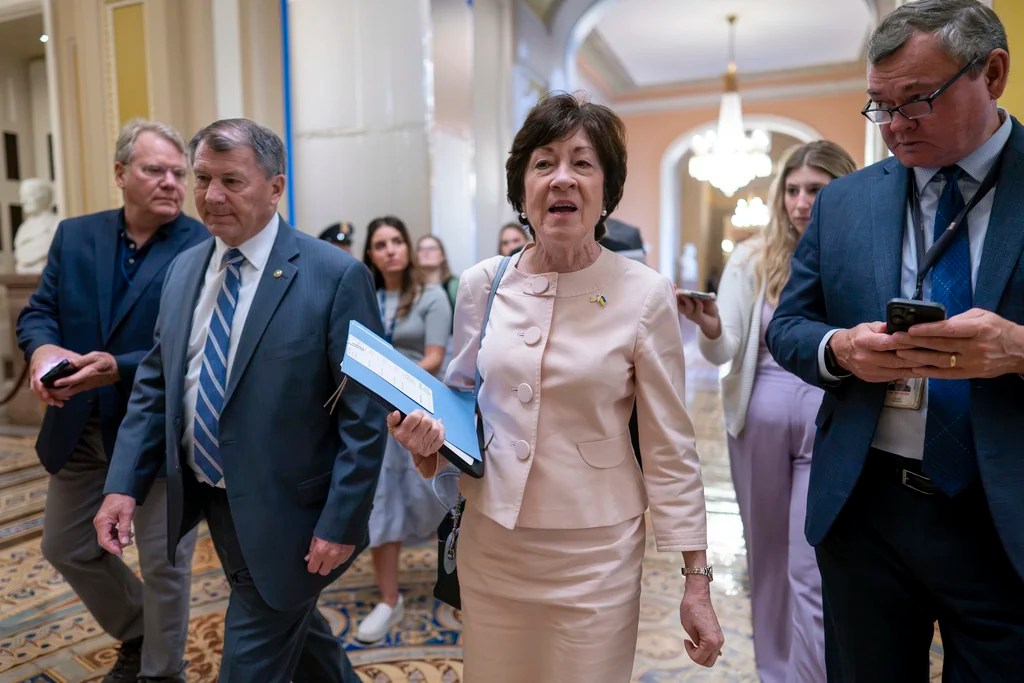President Donald Trump wants to give back $9.4 billion in federal spending to Congress that it has already approved. But it’s proving to be an uphill battle with Senate Republicans.
Some GOP senators don’t want to claw back funds for certain programs, including $1.1 billion to public broadcasting and $900 million in foreign aid for global health, despite a party-wide search for cost-cutting measures across the federal government.
The DOGE-inspired $9.4 billion rescissions legislation that House Republicans passed last week accounts for but a sliver of Trump’s $4 trillion “big, beautiful” tax and spending proposal to advance his domestic agenda. But the desire for Congress to sign off on budget cuts that he’s made by executive orders is compounding what are already fraught policy negotiations among both GOP-led chambers and the White House.
“We’ll all make up our own minds,” Sen. Mike Rounds (R-SD) said recently, reflecting on those urging the Senate to rubberstamp the House. “There’s a reason why these things are in the law in the first place. It’s because we believe that a lot of this stuff is good and it’s good public policy, so it’s OK for them to suggest that they have a different point of view.”
The rescissions legislation would codify cuts identified by the Elon Musk-created Department of Government Efficiency and aim to deliver on GOP pledges of rooting out waste, fraud, and abuse in the federal government. The claw back of billions of funds only requires a simple majority in the 53-47 GOP-controlled chamber rather than the Senate’s usual 60-vote threshold.
House Republicans only narrowly passed it 214-212. New rescissions can’t be added through amendments, but it’s likely senators will seek to strike certain items or minimize spending reductions during a marathon amendment process in the lead-up to a final floor vote.
Senate Majority Leader John Thune (R-SD) does not envision the upper chamber addressing the rescissions until the post-July 4 recess and after Congress approves Trump’s bill. It will need to pass before the bill hits a July 18 expiration date.
The political posturing is well underway.
White House Office of Management and Budget Director Russell Vought will testify next week before the Senate Appropriations Committee about the president’s rescissions request. Sen. Eric Schmitt (R-MO) has been tapped by the White House as the Senate point person to help usher it through.
“Passing President Trump’s Rescissions Package is a MUST DO,” Schmitt posted Thursday.
Sen. Susan Collins (R-ME) is among the more centrist Republicans with concerns over cutting global health funds. Notably, she’ll also lead next week’s hearing with Vought as chairwoman of Senate Appropriations.

“I’m not going to get into the specifics,” Collins told the Washington Examiner of her desires to amend the rescissions legislation. “I’ve made very clear that I do not like the cuts in the global health programs.”
Those include the President’s Emergency Plan for AIDS Relief, or PEPFAR, to fight global aids under the all-but-defunct U.S. Agency for International Development. The bill would claw back $400 million of the $6 billion appropriated by Congress this fiscal year for a program credited with saving millions of lives around the world since its inception under former President George W. Bush.
Rounds and Sen. Lisa Murkowski (R-AK), another centrist, have expressed similar anxieties.
The White House’s official justification says the funds would only come from “programs that neither provide life-saving treatment nor support American interests,” adding that the proposal “aligns with the Administration’s efforts to eliminate wasteful foreign assistance programs” and “restore focus on health and life spending.”
“This best serves the American taxpayer,” the White House said.
Cuts to the Corporation for Public Broadcasting, which funds NPR and PBS, total $1.1 billion. But it’s facing checkered resistance from several members across the ideological spectrum of Senate Republicans, including Collins. Those who represent states with sprawling rural populations, such as Rounds and Murkowski, are particularly concerned about severing constituents from a medium that they say many rely upon for communication and information.
HOUSE SENDS $9.4 BILLION RESCISSIONS PACKAGE TO SENATE AFTER NARROW VICTORY
Public radio is often the “only communications” for rural Native American reservations, according to Rounds.
“The early warning and the natural disaster warning and the weather warning is the AM-FM systems they’ve got,” he said. “That’s of concern to me.”
David Sivak contributed to this report.
